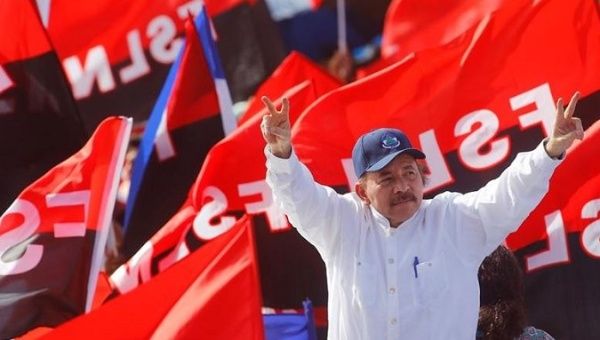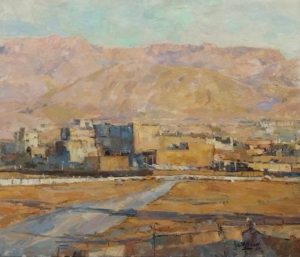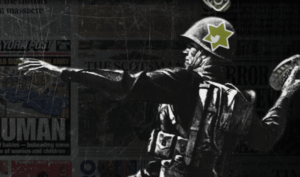Jorge Capelán and Stephen Sefton
Forty years ago in 1979, a huge majority of Nicaraguans led by the Sandinista Front for National Liberation (FSLN) overthrew the cruelest dictatorship in the Americas, a close ally of the United States. Ever since then, the US government has worked to destroy the FSLN. For forty years they have failed miserably, though it has led to enormous suffering for Nicaragua’s people.
When President Daniel Ortega salutes the hundreds of thousands of FSLN supporters on July 19, it will be an unassailable vindication of his own massive political achievement and a truly historic testament to the power of Augusto Sandino’s legacy. All of that would be sufficient to make this national event, in a small country with fewer than seven million people, of tremendous regional significance in Latin America and the Caribbean. But two things make the 40th anniversary of the revolutionary triumph in 1979 even more special and significant.
First, in the current international context, Nicaragua’s unbreakable identification and solidarity with Venezuela and Cuba, who are also supported by Bolivia, has created a regional bloc based on the Bolivarian vision of Hugo Chavez and Fidel Castro, formidably resilient in every sense. Their socialist policies of economic democratisation expose the neoliberal austerity policies of the US and its allies as a deliberate corporate-driven war on the impoverished majority. Likewise, their defense of sovereignty, non-intervention and peaceful resolution of conflicts contrast sharply with the sadism and hypocrisy of the aggression of the US and its allies.
In that context, the Sandinista government’s undeniable social, economic and cultural advances, like those of Cuba and Venezuela, effectively dismantle the mystifying neocolonial labyrinth of impoverishment and dependence. Their success, despite unending US aggression, demonstrates that the US has no viable policy for the region, only its abhorrent Monroe Doctrine mission of loot and domination.
Second, July 19 of this year is the first anniversary of the Nicaraguan people’s defeat of the failed US backed coup attempt of 2018 against Presiden Daniel Ortega. That victory over the vicious, hateful Nicaraguan right-wing and their US backers was an overwhelming, categorical affirmation of broad and deep popular loyalty to the revolutionary leadership of President Ortega and the Sandinista Front for National Liberation.
For two or three weeks in April and May 2018, a majority of people in the country were bemused and unsure about what to think of the unprecedented murderous unrest and psychological warfare they experienced. But within two months, the reality of the coup attempt became clear and the majority reaction against it was patient, resolute and definitive.
In Nicaragua, Venezuela and Cuba, a strategic grass roots discipline, humanity and determination has developed in response to decades of right-wing opposition abuse, violence, sadism, corruption and deceit. In Nicaragua, the insistence of President Daniel Ortega and Vice President Rosario Murillo on dialogue and peaceful resolution of conflict was embodied in the conditional amnesty approved on June 8 this year, that led to the release of around 300 opposition activists who had been sentenced or were awaiting trial for very serious crimes, many involving murder, torture and grievous bodily harm. So, July 19 this year will also be a triumphant vindication of the commitment to Peace, Reconciliation and Understanding which gives the leaders of Cuba, Nicaragua and Venezuela such strong moral prestige and authority both among their own populations and also in the wider region, especially among the Latin American countries.
July 19 also marks further advances in the implementation of the FSLN’s historic program begun 40 years ago in 1979.
Development of the Caribbean Coast, equality between women and men, mass participation of people in literacy, education, health care and both civil and military defense. Perhaps most important of all have been the processes of popular consultation promoted by the FSLN, from the Autonomy Law for Indigenous and Afro-descendent people in the Caribbean Coast and the Constituent processes of the 1980s to the processes of social and economic consensus and dialogue of the last 12 years.
Just as there was clearly one Nicaragua before and a very different Nicaragua after July 19, 1979, so now too there is a new Nicaragua on July 19, 2019. Of particular importance is how the defeat of 2018’s failed coup attempt has vindicated the popular economy’s fundamental role in deepening Nicaragua’s revolutionary democratisation. Hundreds of thousands of previously excluded women and rural families now participate in making a decisive contribution to Nicaragua’s economic development via micro-businesses, collectives and cooperatives.
Two things bear repeating. First, the attempted coup was an attack not against the mistakes that may have been made by the government, but against all the progress and achievements on behalf of peasants and workers that threatened the interests of the national and regional elites.
Second, the coup attempt was indeed defeated, and the coup plotters are today completely discredited in the eyes of Nicaragua’s people. This means that the Sandinista Revolution’s 40th anniversary marks a new stage in the Nicaraguan people’s march towards independence and justice. It symbolises a class victory guaranteeing political power to all Nicaragua’s people, both as subjects of social rights, and also as direct producers controlling decisive spaces in the economy. This is a categorical defeat for the country’s reactionary and traitorous oligarchy who can see power slipping irrevocably from their hands.
In July 2018, the FSLN defeated the US-backed opposition attempt to destroy it, just as it did during the 17 years when it was in opposition after the historic electoral defeat of 1990, storming back to power in the 2006 elections. Promoted by the US and its allies, the 2018 “soft coup” was a life-or-death trial of the resolution of Nicaragua’s people and of the Sandinista movement.
It failed because it crashed against the reality of a people who had been empowered and who identified with the grassroots social and economic policies of a Sandinista government that are regarded by the majority as fair, efficient and focused on the development of the ordinary people of Nicaragua. It also failed thanks to the sacrifice and restraint of the national police and the army during the months of crisis, from which those forces emerged with more popular legitimacy than ever.
Forty years on from 1979, the challenges for Nicaragua and the Sandinista movement are enormous, but so are their advances. Forty years ago, people at the grass-roots level learned to read and write. Today their children are professionals, lawyers, doctors, engineers, revolutionary teachers, trained in an ethic of serving the people.
The Nicaragua of 40 years ago has urbanised impressively. The generation now ready to assume the leadership of Nicaraguan society are children of the previous generation of Sandinista heroes and martyrs who sacrificed everything in the 1970s and 1980s. While the generations that follow may have lived all their lives in the 21st century, the project of Augusto Sandino and of the Sandinista Front is more valid than ever before. It is the vision of a free and sovereign homeland, with social justice, free from ignorance, one in which as Sandino wrote, “the Spirit of Light and Truth, that is, Love”, will reign.
Forty years on, the revolutionary impetus of Sandino, of Carlos Fonseca, of July 19, 1979 continues—unstoppable. Comandante Tomas Borge described the process as one of “patient impatience”, of strategic vision, alert understanding of the historical moment, a process of political discipline and the highest moral values. As long as the Nicaraguan nation exists as an objective, as a project, as a work-in-progress, there will be Sandino and there will be a Sandinista Front ensuring that this revolutionary project will be of, by and for the people.
And if the world ever reaches a stage that no longer needs nations, when all the Earth’s people live in fraternity and human beings live in the “Spirit of Love”, there too will be Sandino, because that is the vision he has bequeathed to us. Forty years after the triumph of 1979 and one year after the defeat of the failed coup attempt, the 40th anniversary celebration signifies absolute revolutionary commitment and unity among Sandinistas of all generations who have gained a new awareness of the historical sense of their identity and are more determined than ever to defend their victories and achievements for Nicaragua, for Latin America and for all of humanity.
(Courtesy: Telesur)




